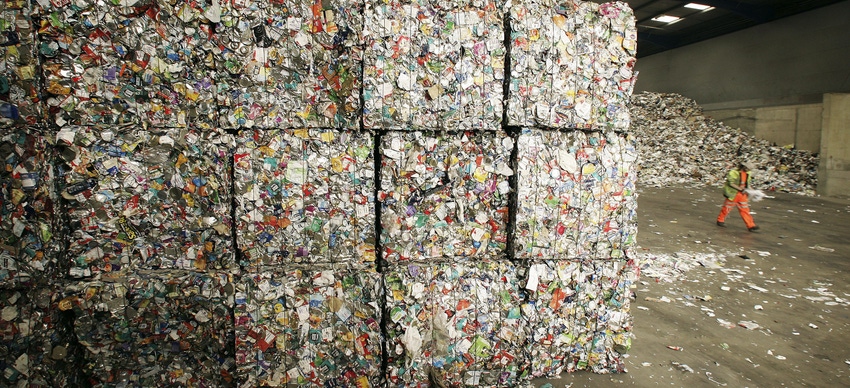2018 isn’t likely to be a banner year for recycling in the U.S.

2018 isn’t likely to be a banner year for recycling in the U.S. We’re facing significant uncertainty about markets because of China’s ban on importing recyclables, and our national attention is preoccupied with other issues, to say the least. Yet while the U.S. continues to stagnate at a 35 percent national recycling rate, the rest of the world is doubling down on recycling as a tool to create green jobs, bolster local economies and reduce climate pollution. We need to only look across the pond in Europe to see that the race is on for zero waste.
According to the new report, “Recycling—Who Really Leads the World?” from Eunomia and the European Environmental Bureau, Germany is the best in the world with a 56 percent recycling rate. Overall, European countries took eight of the top 10 slots. (These rates have been adjusted to exclude incineration and for differences in how countries report.)
Country | MSW Recycling Rate |
Germany | 56% |
Austria | 54% |
South Korea | 54% |
Wales | 52% |
Switzerland | 50% |
Italy | 50% |
Belgium | 49% |
Netherlands | 46% |
Slovenia | 46% |
Singapore | 34% |
Barely squeaking onto the top 25 list in the bottom spot is the U.S. Worse yet, we ranked No. 5 on the list of the most wasteful countries based on all the trash we produce per person. While it may come as no surprise that the U.S. isn’t the best at recycling, the report does show there’s plenty of opportunity to remake ourselves as the comeback kid in the race for the world’s best recyclers.
Country | Waste Generated (kg/person) |
Singapore | 1394 |
Denmark | 799 |
Hong Kong | 776 |
Switzerland | 742 |
United States | 735 |
Wales leaps from laggard to leader
The big news from the report isn’t Germany’s dominance—it’s Wales that is stealing the headlines with its Cinderella story. Over the past 20 years, Wales increased its recycling rate from five percent to more than 50 percent, and now ranks No. 4 in the world. The island country of three million, part of the United Kingdom, is on record pace to hit its goal of zero waste by 2050.
Strong federal leadership in Wales is a big part of its leap from laggard to leader. The country set bold recycling targets and paired them with funding to local authorities to implement programs, which signaled that this was a national priority. More than 85 percent of local authorities have hit their targets, and fines are being discussed for those falling short.
2030 EU goals set sights on circular economy
Top-level government leadership underlies nearly every recycling success story in the EU, and the bar is only getting higher. The EU is on the cusp of a series of new updates to many high-level, waste-related policies that will further drive resource recovery. The new “Circular Economy Package” legislation, currently in its final stages in the EU Parliament, will require EU countries to recycle 65 percent by 2030, with 70 percent recycling of packaging. Manufacturers will have to pay a greater share toward collecting and recycling their products under extended producer responsibility programs. Lastly, countries will have to continue to invest in diversion programs and move away from landfills—no more than 10 percent of waste can be sent to landfills by 2030.
It still comes down to local action
While strong national policies and goals greatly help to drive recycling, they’re not the end-all be-all. Getting real results depends entirely on how well programs are implemented at the local level. Here are the state and local polices behind Europe’s high performance:
Widespread collection programs for recycling and compost
Legally mandated recycling goals
Requirements to separate materials, supported by disposal bans
Funding for infrastructure and programs, both through government funding and extended producer responsibility laws
Financial incentives to encourage recycling, including bottle deposits, pay-as-you-throw volume-based pricing and disposal fees/taxes
Many U.S. states and communities are following this recipe for success and blazing forward toward zero waste. These locally focused actions are our ticket to success in the void of national leadership.
Why recycling matters in the EU
With so much national attention and commitment to recycling in the EU, it begs the question of motivation—what does the EU know that we don’t? It turns out it’s all about business: The EU Circular Economy Package has been built on the business case first and the competitive advantage of being more resource efficient.
The community and social benefits are part of the mix as well. In its Zero Waste Cities Masterplan, Zero Waste Europe highlights how zero waste builds a stronger sense of community by:
Increasing social interactions through more sharing and material reuse
Keeping materials flowing in the local economy and supporting local jobs
Promoting urban gardening for healthier eating and more neighborhood involvement
Simply put, zero waste supports the circular economy that businesses need for the 21st century, as well as the sustainable, healthy lifestyle that residents want. Let’s put our cities and states on this path and create the future we want, starting at the local level where we have the power for change.
Kate Bailey is the project director of Eco-Cycle Solutions and works with citizens, government staff and elected officials to implement zero waste solutions around the U.S.
About the Author(s)
You May Also Like


